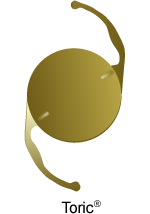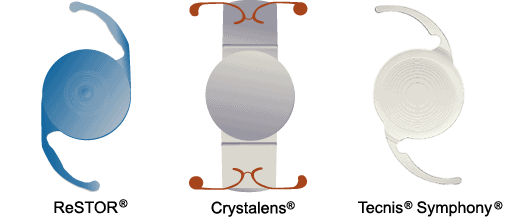To treat cataracts, surgeons remove the natural lens and replace it with an artificial lens (intraocular lens or IOL) which is determined preoperatively. To reduce or eliminate the need for glasses and contact lenses after cataract surgery, patients need to choose a lens implant that is designed to address refractive errors and help patients see at near, far and intermediate distances. Some Advanced Technology Lenses even have the capability of correcting astigmatism as well as distance, middle, and near vision to give the patient the clearest vision.
Discussing visual goals with your surgeon before completion of your cataract surgery is important. In order to determine what type of lens implant would be ideal for your best personal vision, you will need to schedule an evaluation with Berks Eye Physicians & Surgeons. Only a professional ophthalmologist can help determine which specific type of lens implant will be appropriate.
Please call us at 610-372-0712 to make an appointment.
Types of IOLs
Intraocular lens (IOL) implants have been used successfully for years to replace cataractous natural lenses that have become sufficiently opaque to interfere with good vision. Until 2005, the only IOL option for patients was the monofocal lens which only focuses at a limited vision range. Today, other Advanced Technology IOLs are also available that can help cataract patients see at near, far and intermediate distances and/or correcting astigmatism.
Monofocal IOL
Monofocal IOLs are a single focus lens. This IOL allows for correction in either far or near vision, not both. Monofocal IOLs are widely used today and improve vision for many of our patients.
- Provides good vision at one distance (typically far vision)
- Requires reading glasses after surgery
- Covered by Medicare
Advanced Technology IOLs
Recent technological advancements dramatically improve a patient’s ability to see with lens implants after cataract surgery or even as refractive lens exchange before the development of cataracts.
Toric IOL

Our cataract surgeons are pleased to offer Toric IOLs for Astigmatism correction after cataract surgery. The recent advancements in Intraocular Lens (IOL) technology have now made it possible to provide an effective solution for patients that have astigmatism.
A standard monofocal IOL cannot correct or compensate for corneal astigmatism. Corneal astigmatism is common and occurs when the cornea is not perfectly round. One side of the curve is steeper than the other like a football. This causes light to focus at more than one point on the retina, which creates blurred vision.
The Toric IOL is a custom ordered lens that is specifically designed to neutralize the astigmatism in the cornea and improve the overall quality of vision. For those who have astigmatism, the Toric IOL makes it possible to correct your cataract and astigmatism in one safe procedure. While you will still need glasses for most near activities, your need for distance glasses should be much less. The Toric IOL technology uses biocompatible materials that have been successfully used in lens implants and proven safe for the eye. There is an additional cost for this lens implant.
Multifocal / Extended Range of Focus IOL
The Multifocal/ Extended Range of Focus IOL now has the capability of correcting astigmatism as well as distance, middle, and near vision to give the patient the clearest vision. There is an additional cost for this lens implant.
Multifocal / Extended Range of Vision IOL
Multifocal IOLs restore clear vision at multiple distances after cataract surgery. They can provide clear vision for near, intermediate and far distances and are great for patients with active lifestyles. In some cases, Multifocal IOLs eliminate the need to wear glasses after cataract surgery.
Presbyopia is the loss of near or intermediate vision that occurs with age, due to decreased flexibility of the natural lens. These changes lead to the need for reading glasses or bifocals. In order to achieve the greatest freedom from glasses after cataract surgery, the correction of presbyopia must be addressed. Unlike the flat surface of a monofocal IOL, the multi-tiered concentric ring surface of the Multifocal/ Extended Range of Vision IOL spreads light over multiple focal points as it passes through the lens, allowing for clear vision over a full range of distances. These intraocular lens implants are designed to reduce or eliminate the need for glasses for most vision activities like putting on makeup or shaving; reading newsprint or prescription bottles; watching television or movies in the theater; seeing your wristwatch and cell phone; looking at your computer screen and dashboard; reading road signs and following a golf ball down the fairway!

With the advent of Advanced Technology Multifocal/Extended Range of Vision lens implants, presbyopia can now be corrected with a broader range of sharper vision. Presbyopia affects a large portion of our aging population and often requires bifocal glasses. People in their mid-forties that have trouble with reading typically experience the first effects of presbyopia. Presbyopia is an accommodation problem with the lens of the eye. As the lens hardens and becomes inflexible with age, it becomes more difficult to focus.
There is an additional cost for this lens implant.
All IOLs, whether they be monofocal, monofocal Toric, multifocal or extended range of vision, have an additional benefit. Besides correcting vision, these lens implants also protect against harmful ultraviolet (UV) wavelength damaging light rays.
 1802 Paper Mill Road, Wyomissing, PA 19610
1802 Paper Mill Road, Wyomissing, PA 19610

